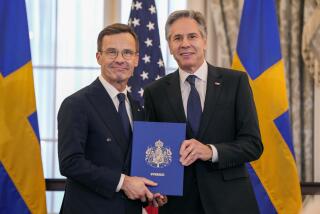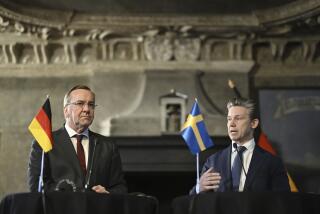Sweden Rethinking Neutrality in the Face of New Global Threats
- Share via
STOCKHOLM — For 200 years, Sweden has spared its pristine land and peace-loving people the ravages of war by steadfastly clinging to neutrality no matter what bloody mayhem exploded around it.
Neither in the two world wars nor in the superpower conflict that divided Europe for half a century did this serene Nordic nation take sides in any armed or ideological combat.
But the post-Cold War world has presented the global community with radically altered defense and security challenges. Especially in the post-Sept. 11 environment, Swedes concede that no one can afford to remain neutral in the face of threats to fundamental democratic values.
Prime Minister Goran Persson’s Social Democrat-led government called nearly a year ago for reevaluation of security doctrine, noting that the fall of the Iron Curtain and integration of eastern and western Europe have all but erased the continental divide Sweden was long forced to straddle.
Since the terrorist attacks on New York and the Pentagon, say Swedes from across the political spectrum, neutrality is no longer just outdated but indefensible in the fearful new world order.
“Just because we have the option of neutrality doesn’t mean we have to be neutral. We are certainly not neutral in the war against terrorism. We are participating in this struggle like any other friend of the United States,” insists Deputy Foreign Minister Hans Dahlgren.
Anti-Terrorism Support Marks a Watershed
Persson and Foreign Minister Anna Lindh have pledged Sweden’s full support for the military campaign against Osama bin Laden and the Taliban regime in Afghanistan that shelters the suspected mastermind of the Sept. 11 attacks. That help has so far meant only moral support and solidarity, but it nonetheless marks a watershed in a country where only a few years ago any endorsement of military action would have been considered heresy.
Though Swedes tend to see their long track record on the sidelines of global conflicts as a positive attribute in their national makeup, they have been measurably supportive of the leadership’s efforts to shoulder a bigger load in international security. Polls conducted last month show support for Persson’s Social Democrats at a four-year high.
Sweden’s relinquishing of neutrality may sound new, but it has been evolving for more than a decade, since the pro-democracy revolutions of 1989. The country now deploys its citizens on U.N. peacekeeping missions, and it is helping to develop new weapons and a rapid-reaction force for the European Union.
“What has changed is Sweden’s freedom to maneuver. It’s now possible to do things with other countries that couldn’t have been done before the Cold War ended,” Dahlgren says, noting Sweden’s participation in NATO military maneuvers that would have angered the Soviet Union of a dozen years ago.
Sweden’s government and a majority of its 9 million citizens still oppose formal membership in the North Atlantic Treaty Organization. But leaders here note there are new opportunities for collaboration short of full alliance that could contribute to a more effective pursuit of peace. Neutrality in the world’s new conflicts is no longer state policy, but most here still remain committed to nonalignment--remaining outside the sole military bloc in Europe, NATO.
That the combined military might of NATO’s two biggest forces, the United States and Britain, hasn’t made tremendous headway against Bin Laden and his terror network nearly two months after the Sept. 11 attacks shows that “there’s something missing from the world’s security toolbox,” says Viola Furubjelke, head of the parliamentary foreign affairs committee.
“Maybe what is needed is not more aircraft or more bombs but new thinking,” she says of the traditional war being waged against terrorism. “Sweden can be more useful, even for NATO, if we stay outside a conventional alliance.”
Like many Swedish politicians, Furubjelke points out that neutrality is not a policy but an option, and one that has no role in the current international struggle.
“It’s a change that has been going on little by little,” Birgitta Alani, deputy director of the Stockholm International Peace Research Institute, says of Sweden’s devolution from neutrality. “I don’t know if it is happening faster since Sept. 11, but it has been evolving since the end of the Cold War.”
Sweden’s loss of innocence began decades ago. Terrorism and hostage-taking afflicted embassies and banks here in the 1970s, including the infamous Red Army Faction seizure of 12 West German diplomats in 1975 and the standoff at the Sveriges Kreditbank two years earlier. In the latter, four bank employees were held for six days, so long that the hostages began to bond with their captors, in a psychological phenomenon that came to be known as the Stockholm Syndrome. The 1986 assassination of Prime Minister Olof Palme on a quiet Stockholm street was seen as the coup de grace for this country’s sense of benign isolation.
EU Membership Bolsters Ties to NATO
The shift from neutrality to nonalignment began almost unnoticed in the early 1990s, as relations between the former communist countries of Eastern Europe and the capitalist states of the West improved, defusing the conflict Stockholm had stayed out of. European Union membership in 1995 pushed Sweden deeper into the de facto NATO camp, and the country has since been tied economically, socially and in security matters with the 14 other EU member states, 11 of which are also part of NATO.
Sweden’s eroding position as a military outsider is likely to come under even more pressure if NATO expands to encompass the three Baltic states that were once part of the Soviet Union and are now close Nordic allies: Latvia, Lithuania and Estonia. This would leave only Sweden and Finland without clear responsibilities for the region’s defense.
Still, at the northern fringes of Europe and renowned for its generous spending on Third World development, Sweden had no obvious enemies from which the country felt it needed allied protection. Only in the face of the newly recognized terrorism threat was military collaboration viewed as a possible security enhancement.
“Today, NATO dominates the security structures of Europe, and it is potentially dangerous for Sweden not to have a full voice in this region,” says Lars Leijonborg, head of the Liberal Party, the only political faction openly calling for Sweden to join NATO. “Swedish troops are under NATO command in the Balkans. We are full members in the Partnership for Peace [a NATO-organized military cooperation network]. We are involved in a lot of common projects with the alliance, and it would be much better to sit at the table where the decisions are being made.”
But the Swedish population is less convinced that the country should abandon nonalignment, even if it has decided that neutrality is no longer appropriate. Polls continue to show 65% or more against formal NATO membership, although commitments to peacekeeping and EU defense projects remain firm.
Leijonborg notes that Sweden has for years been discussing with EU allies in NATO how to ensure that its weaponry and armed forces are compatible with other defense units on the continent--a clear sign that the country recognizes the inevitability of military as well as economic cooperation.
As one of Europe’s most technologically advanced countries, Sweden also is involved in a six-nation project to enhance regional readiness and upgrade military equipment, a role in the continent’s military-industrial complex that some say bestows de facto NATO alignment. All five other participants--Britain, Germany, Italy, France and Spain--already belong to the Western alliance, and Sweden’s leading arms manufacturers are all at least partly owned by companies in NATO states.
“There are a lot of paradoxes here,” Leijonborg says. “In many ways, the reality is different from the policy.”
Acknowledging that Swedes have been indoctrinated to believe that neutrality and nonalignment are safer than siding with other Western states, he adds that “the Social Democrats have created this myth, and now they are trapped in it.”
More to Read
Sign up for Essential California
The most important California stories and recommendations in your inbox every morning.
You may occasionally receive promotional content from the Los Angeles Times.














